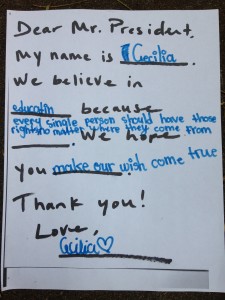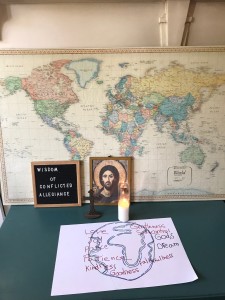 This past Sunday, our community spent some time wrestling with the implications of “allegiance” in light of the 4th of July holiday. It was good, hard and so, so important.
This past Sunday, our community spent some time wrestling with the implications of “allegiance” in light of the 4th of July holiday. It was good, hard and so, so important.
As followers of Jesus and citizens of a nation-state, we have a dual allegiance to the kingdom of God and to the United States. Reality is, the values of the kingdom of God as were embodied in Jesus (last will be first and first will be last, love & pray for your enemy, money is the root of all evil, etc) often come in sharp contrast to the values of the United States (success = winning), keep out or kill your enemy, money is a sign of blessing, etc). There is no doubt we have a responsibly to both, BUT the question has to be, “Which has our PRIMARY allegiance?”
We have have to embrace a conflicted allegiance.
On the one hand, we need to engage the United States as participants in creating a society that leads to the flourishing of everyone. As participants in a democracy, we (thankfully!) have that option. On the other, we need to always place our primary hope and be submitted to the rule and reign of the kingdom of God…even if that runs into contrast to the values of a nation-state.
Throughout history, we have seen the implications of Christians giving their primary allegiance to a political institution over and beyond the kingdom of God and it’s not pretty. Whether Rome under Constantine, the Crusades, the Inquisition or even Manifest Destiny, we have found ways to invert our allegiance and place God’s “blessing” on our desire for power, wealth & expansion at the cost of human life.
This inverted allegiance is idolatry.
Jesus and the early church modeled this conflicted allegiance all throughout the pages of the gospels and Acts. Jesus tells is followers to “render to Caesar what is Caesar’s” not as a way to affirm Caesar’s authority, but to remind his followers that the economy of the kingdom is COMPLETELY different than the economy of the empire. Paul, as a Roman citizen, was uncompromising in his kingdom allegiance to the point of regular imprisonment (as was the case for many early followers of Jesus…our Christian story literally stands on the shoulders of the incarcerated). He didn’t reject his Roman citizenship, he leveraged it for the flourishing of those without his inherited privilege and continually gave his primary allegiance to the kingdom.
What does this mean?
When we live a conflicted allegiance, it liberates us to unapologetically give our lives to the values of the kingdom of God, while continually discerning our constructive engagement/support/participation in the United States. For our family, it means we stand with and care for the people fleeing violence on our border because that’s a mandate of the kingdom of God. AND, we leverage our influence/allegiance to the United States to help fix broken systems that are breaking our neighbors. It means we look our neighbors on the streets in the eye to honor their humanity AND we stand in city council meetings advocating for systems to support their healing.
This stuff isn’t easy, but I’m convinced it’s the necessary way to find and follow Jesus in the midst of living in a culture so partisan, political and polarized.
Today, our family will celebrate our conflicted allegiance.
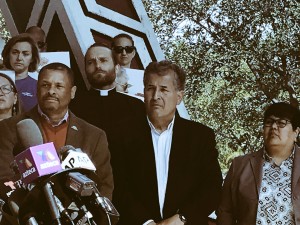 Today, President Trump will make his first visit to California since his inauguration. In fact, his motorcade is driving to the border as I type this. As we know, one of his campaign promises was to build a wall on the southern border and contractors having been submitting bids for the project ever since. There are now only eight contractors in the running to win the bid and they have each built a prototype of their wall down here on our border.
Today, President Trump will make his first visit to California since his inauguration. In fact, his motorcade is driving to the border as I type this. As we know, one of his campaign promises was to build a wall on the southern border and contractors having been submitting bids for the project ever since. There are now only eight contractors in the running to win the bid and they have each built a prototype of their wall down here on our border. 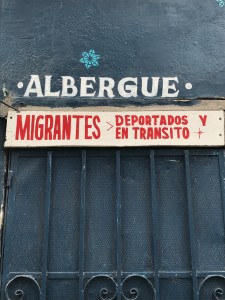 In the midst of figuring out a road forward on DACA and comprehensive immigration reform, President Trump made a statement about countries who had the most need for support/relief in the form of the United States granting immigration status to their citizens. He called them “shithole countries.” A few thoughts:
In the midst of figuring out a road forward on DACA and comprehensive immigration reform, President Trump made a statement about countries who had the most need for support/relief in the form of the United States granting immigration status to their citizens. He called them “shithole countries.” A few thoughts: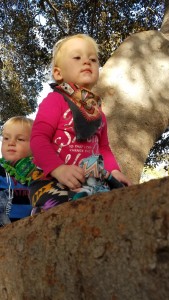 Jimmy Carter recently said, “Abuse of women as the primary human rights issue in the world today.”
Jimmy Carter recently said, “Abuse of women as the primary human rights issue in the world today.” 